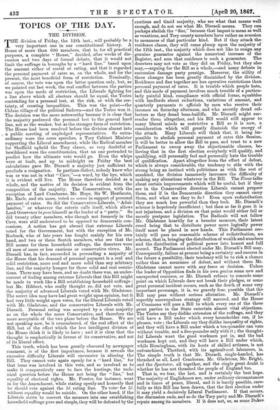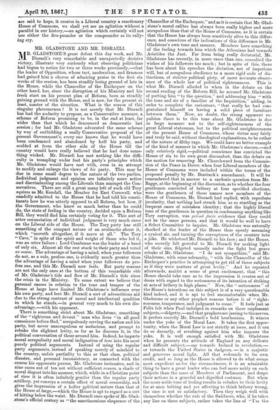TOPICS OF THE DAY.
THE DIVISION. THE division of Friday, the 12th inst., will probably be a very important one in our constitutional history. A House of more than 600 members, that is, for all practical purposes, a complete " House," decided, after weeks of dis- cussion and two days of formal debate, that it would not limit the suffrage in boroughs by a " hard line," based upon the amount either of rental or rating, and that it regarded the personal payment of rates as, on the whole, and for the present, the most beneficial form of restriction. Nominally, of course, the vote was upon the latter question only, but, as we pointed out last week, the real conflict between the parties was upon the mode of restriction, the Liberals fighting for a line above which all electors should be equal, the Tories contending for a personal test, at the risk, or with the cer- tainty, of creating inequalities. This was the point—the Chlum village of the political Sadowa—and the Tories won it. The decision was the more noteworthy because it is clear that the majority preferred the personal test to the general hard line, not as the weaker, but as the stronger form of restriction. The House had been resolved before the division almost into . a public meeting of unpledged representatives. So extra- ordinary were the cross speeches, a Tory Cabinet Minister supporting the Liberal amendment, while the Radical member for Sheffield upheld the Tory clause, so very doubtful or bewildered were the constituencies, that no one pretended to predict how the ultimate vote would go. Even the whips were at fault, and up to midnight on Friday the best calculations gave Mr. Disraeli a majority just sufficient to preclude a resignation. In partizan dialect, nobody knew who was or was not in what " Cave,"—a word, by the bye, which it is evident will live. The House therefore decided as a whole, and the motive of its decision is evident from the composition of the majority. The Conservatives, with the exception of Lord Cranborne, Mr. Hope, Sir W. Heathcote, Mr. Earle, and six more, voted en masse in support of personal payment of rates. So did the Conservative-Liberals, " Adul- lamites," or whatever the coterie calls itself, which allows Lord Grosvenor to pose himself as the leader of a " party." So did twenty other members, who though not formerly in the Cave, were still understood to be opposed to democratic con- cessions. A notion has got abroad that extreme Liberals voted for the Government, but with the exception of Mr. Roebuck, who of late years has fought mainly for his own hand, and two or three Scotch members, who see that the Bill means for them household suffrage, the deserters were all men of more or less cautious or conservative views. Mr. Disraeli has, in fact, succeeded in persuading a majority of the House that his demand of personal payment is a real and solid restriction, more real and more solid than any arbitrary line, and the majority hunger for those solid and real restric- tions. There may have been, and no doubt there was, an under- current of feeling among extreme Liberals that this Bill might be made to work like a Bill establishing household suffrage ; but Mr. Hibbert, who really thought so, did not vote, and the majority of advanced Liberals voted with Mr. Gladstone. The secret idea may have had great weight upon opinion, but it had very little weight upon votes, for the liberal Liberals voted with Mr. Gladstone, and the conservative Liberals with Mr. Disraeli. Personal rating was accepted by a clear majority as on the whole the more Conservative, and therefore the more acceptable of the two plans before the House. We are not speaking now, be it remembered, of the real effect of the Bill, but of the effect which the less intelligent division of the House think it is likely to have ; and it is clear that the thought is emphatically in favour of its conservative, and not of its liberal effect.
This truth, which has been greatly obscured by newspaper comment, is of the first importance, because it reveals the excessive difficulty Liberals will encounter in altering the Bill. They cannot vote again openly for a "hard line," for that issue was involved in this vote, and so involved as to make it comparatively easy to face the hustings, the tech- nical question before the House not being the " line," but equality of electoral rights. Mr. Forster, for instance, went in for the Amendment, while stating openly and honestly that he should vote against the 5/. rating line. To vote- for 5/. without equality would be suicide. On the other hand, if the Liberals strive to convert the measure into one establishing household suffrage pure and simple, they will be defeated by the cautious and timid majority, who see what that means well enough, and do not see what Mr. Disraeli means. They can perhaps abolish the "fine," because that impost is mean as well as vexatious, and Tory county members have rather an aversion to meanness of that particular kind. But if they attack the residence clause, they will come plump upon the majority of the 12th inst., the majority which does not like to resign any genuine guarantee against the numerical increase of the Register, and sees that residence is such a guarantee. The deserters may not vote as they did on Friday, but they also may,—arguing for the Bill as a whole,—and many defeats in succession damage party prestige. Moreover, the utility of these changes has been greatly diminished by the division.. Residence and fine together are less operative restrictions than personal payment of rates. It is trouble which people hate,. and this mode of payment involves much trouble of a particu- larly painful kind, compliance with official forms, squabbles with landlords about reductions, variations of amount, and quarterly payments to officials by men who receive their incomes on Saturday afternoon, and who secretly dread col- lectors as they dread bum-bailiffs. Mr. Disraeli might sur- render them altogether, and his Bill would still appear to many liberal minds as restrictive a Bill as it is now, a consideration which will greatly diminish the energy of the attack. Many Liberals will think that, it being im- possible to abolish personal payment of rates this Session, it will be better to allow the Bill to pass, and trust to a new Parliament to sweep away the objectionable clauses, be- lieving that in the first election everybody will qualify, and qualifying, will personally feel and personally hate the trouble of qualification. Apart altogether from the effect of defeat, which is always considerable, the tendency to side with the strong being an instinct with politicians as with the rest of mankind, the division immensely increases the difficulty of making any alterations whatever in the Bill. The Times talks about certain improvements which will be useful, but if they are in the Conservative direction Liberals cannot propose them, and if in the Democratic direction they cannot carry them, and what are they to do ? Even upon redistribution they are much less powerful than they look. Mr. Disraeli's scheme is hopelessly insufficient ; but then as far it goes it is not injurious, and a division on that point would either fail or merely postpone legislation. The Radicals will not follow Mr. Gladstone heartily for a broader measure, their latent creed being that to distribute power more logically power itself must be placed in new hands. This Parliament cer- tainly will pass no reasonable scheme of redistribution, no scheme, that is, bringing the distribution of wealth and numbers and the distribution of political power into honest and full accord. The Parliament elected under Mr. Disraeli's Bill may. Consequently, failure at present being a certainty and success in the future a possibility, their tendency will be to risk a chance rather than an assurance of defeat, and without them Mr. Gladstone cannot move with any force or decision. Unless the leader of Opposition finds in his own genius some new and unexpected resource, or Mr. Disraeli refuses to concede some point on which Liberals dare not break their pledges, or some great personal incident occurs, such as the death of some very important personage, it is, we gravely fear, possible that the Bill may pass without serious alteration. Mr. Disraeli's superbly unscrupulous strategy will succeed, and the House of Commons will pass a Bill to which every one of the three great parties in the State entertain almost vital objections. The Tories say they dislike extension of the suffrage, and they will have a Bill under which every householder can, if he pleases, vote ; the Liberals say they dislike inequality of rights, and they will have a Bill under which a ten-pounder can vote without trouble, and a five-pounder only with it ; the thought- ful Liberals want the good workmen put in, and the bad workmen kept out, and they will have a Bill under which, while Birmingham, with its hosts of skilled artizans, is not enfranchised, Thetford, with its agricultural labourers, is. The simple truth is that Mr. Disraeli, single-handed, has thrashed us all, Lord Cranborne, Mr. Gladstone, Mr. Bright, and the Spectator, all together, and the single great doubt is whether he has not thrashed the people of England too.
That is, we fear, the last, and is certainly the best hope.. The majority of Englishmen are, under ordinary circumstances and in times of peace, liberal, and it is barely possible, care- fully as this Bill has been drawn, that the first election under it may yield a decisively Liberal Parliament. If that occurs, the discussion ends, and so do the Tory party and Mr. Disraeli's repute among its members. If it does not, or, as some Dukes are said to hope, it creates in a Liberal country a reactionary House of Commons, we shall yet see an agitation without a parallel in our history,—an agitation which certainly will not use either the five-pounder or the compounder as its rally- ing cry.































 Previous page
Previous page